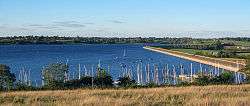Draycote Water
| Draycote Water | |
|---|---|
 | |
| Location | Warwickshire |
| Coordinates | 52°19′02″N 1°20′29″W / 52.31727°N 1.34127°WCoordinates: 52°19′02″N 1°20′29″W / 52.31727°N 1.34127°W |
| Lake type | reservoir |
| Basin countries | United Kingdom |
| Managing agency | Severn Trent Water |
| First flooded | 1969 |
| Surface area | 2.43 square kilometres (600 acres) |
| Average depth | 19.7 metres (65 ft) |
| Water volume | 22,730,000m³ (5 billion gallons) |
Draycote Water is a reservoir and country park near the village of Dunchurch, 3.75 miles (6 km) south of Rugby in Warwickshire, England, owned and operated by Severn Trent Water. It supplies drinking water to Rugby, via Barby Storage Reservoir, and is named after the nearby hamlet of Draycote.
The reservoir was created in the 1960s and was opened in January 1969 [1] and is by far the largest expanse of water in Warwickshire. It covers more than 600 acres (240 hectares) and holds up to 5 billion gallons (23 million m³) of water.The water is extracted by a tower on the north west side of the reservoir.
The reservoir is filled by water that is pumped uphill from the river Leam at Eathorpe village and also from a supply at Stanford reservoir north of Rugby.
It is renowned as a site for Birdwatching and has a bird hide, with a feeding station sponsored by the West Midland Bird Club. Severn-Trent also manage an adjacent 20 acre (81,000 m²) country park.
Draycote Water is now home to a herd of over 200 alpacas. Toft Alpacas is based on the banks of the reservoir and the animals can be seen from the road surrounding Draycote. Public footpath walks can be taken off the water to get a closer look at the farm and these unusual inhabitants of rural Warwickshire.
Draycote is particularly popular with boaters, windsurfers and fly fishers. Fly fishing is for brown trout and rainbow trout from the banks or from boats which can be hired from the fishing lodge.
It is also popular with cyclists and walkers.
Draycote Water is on the A426 road at grid reference SP450690.
Notes
- ↑ Aspects of 20th Century Rugby, Rugby Local History Research Group